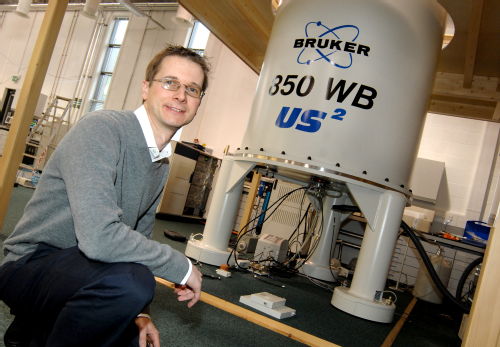UK’s first 1 GHz solid-state NMR Spectrometer funded at Warwick
The UK’s first 1 GHz solid-state Nuclear Magnetic Resonance (NMR) spectrometer is on its way to the University of Warwick, thanks to £8 million from the Engineering and Physical Sciences Research Council (EPSRC).
Part of a new £20 million investment by EPSRC in NMR equipment across UK institutions, the new 1 GHz NMR instrument at Warwick will provide new structural and dynamic information in chemistry, materials science and biology.
Potential applications for the new facility will include improved pharmaceutical formulations and drug delivery, as well as better quality materials for energy and catalysis.
The high-field solid-state NMR facility at Warwick will serve the national research community in the physical and life sciences.
It will add to the already significant NMR capabilities at the University of Warwick – including the existing 850 MHz high-field solid-state NMR National Research Facility, which has been serving a broad academic and industrial user-base since 2010.
The new 1 GHz NMR instrument based at Warwick will enable more PhD researchers from across the country to be trained in a variety of disciplines with the most advanced equipment. Crucial high-end industrial research in sectors such as pharmaceuticals and catalysis will also benefit greatly thanks to this new investment.
Professor Steven Brown, from the University of Warwick's Solid State NMR Group, commented:
“It is tremendous for the UK research community that this bid for a world-leading 1 GHz NMR system dedicated to solid-state applications has, with the support of scientists from 18 UK Universities and 6 UK industry companies, been successful.”
Professor Steven Brown is well known for the development of advanced solid-state NMR techniques, principally for the nuclei of relevance for applications to organic molecules, notably pharmaceutical molecules. He is Director of the current EPSRC National Research Facility for High-Field Solid-State NMR.
Professor Pam Thomas, Pro-Vice Chancellor (Research) at the University of Warwick, said:
“I am proud that Warwick’s NMR capabilities are already among the best nationally and globally, and this new investment will enable us to continue contributing significant research to the fields of healthcare, academia and industry.
“I look forward to seeing the exciting advances that this new facility will bring in the near future.”
The Midlands Innovation Partnership of Universities is already world-leading in its NMR capabilities, and alongside the new 1 GHz solid-state NMR instrument at Warwick, this tranche of funding will establish a further new 1.0 GHz spectrometer for biomolecular solution-state NMR at the University of Birmingham, and enable upgrades to existing 800 MHz systems at the Universities of Leicester and Nottingham.
The investment in very high and ultra-high field Nuclear Magnetic Resonance (NMR) spectroscopy was unveiled at the official launch of UK Research and Innovation in London. NMR is a key technique that has impact across a wide span of science from materials science to medicine.
The funding was coordinated by EPSRC and also comes from three other research councils: BBSRC, MRC and NERC, who have supported the funding.
Notes:
Image: Professor Steven Brown at the University of Warwick's existing 850 MHz high-field solid-state NMR National Research Facility - credit University of Warwick. CLICK IMAGE FOR HIGH RES.
More information on The University of Warwick's Solid State NMR Group here.
Further information contact:
Luke Walton, International Press Manager
+44 (0) 7824 540 863
+44 (0) 2476 150 868
L dot Walton dot 1 at warwick dot ac dot uk

